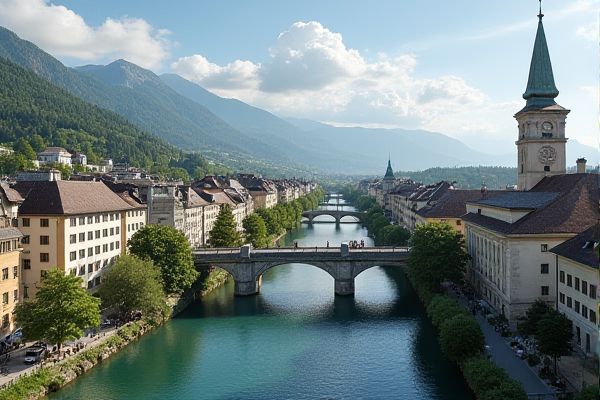
Cost of living in Austria: Higher cost in major cities. Health insurance requirements. Public transportation expenses. Grocery costs vary by location. Utility bills can be high. Childcare and education fees. Affordable public healthcare. Rental prices fluctuate widely. Dining out is expensive. Seasonal clothing prices.
Higher cost in major cities.
The cost of living in Austria is notably higher in major cities such as Vienna, Salzburg, and Innsbruck, with Vienna being 10-20% more expensive than smaller cities, primarily due to housing costs. For example, rent prices in Vienna range from EUR950 to EUR1,500 for a one-bedroom apartment, significantly higher than in cities like Linz. For more information on the cost of living, especially in Vienna, you can visit the Terra Tern website which provides insightful details on living expenses in these urban centers.
Health insurance requirements.
In Austria, Health Insurance is compulsory for most residents, encompassing those in paid employment, self-employed individuals, and pensioners. The costs involve monthly premiums, such as EUR24.42 for students and EUR69.13 for self-insured students, along with co-payments for services like prescription medications and hospital stays. Additionally, there is an annual charge for the e-card. For more detailed information on the health insurance system, you can visit the official site for Living and Working in Austria, where you will find comprehensive resources about living healthily in Austria.
Public transportation expenses.
Public transportation expenses in Austria include a one-way ticket costing around EUR2.40 in Vienna, Salzburg, and Innsbruck, while a monthly pass ranges from EUR45 in Vienna to EUR59.70 in Innsbruck. Additionally, taxis start at approximately EUR4 to EUR8.15 depending on the city, and gas costs about EUR1.54 to EUR1.67 per liter. For more in-depth information on living expenses, you can visit the Cost of Living Austria page for a comprehensive overview of daily expenses and lifestyle considerations in various Austrian cities.
Grocery costs vary by location.
Grocery costs in Austria can vary significantly by location, with smaller, over-priced stores like Spar and Billa offering limited selections, while larger and specialty stores provide a wider variety of items at different price points. Additionally, prices can be reasonable in mainstream grocers, especially when compared to other EU cities like Paris or London.
Utility bills can be high.
Utility bills in Austria can be significant, with electricity costing EUR0.25-EUR0.35 per kWh and heating ranging from EUR80-EUR150 per month. Water typically runs at EUR30-EUR50 per month, while garbage collection costs about EUR15-EUR30 per month. Additionally, internet costs can range from EUR30-EUR50 for a 100 Mbps connection.
Childcare and education fees.
In Austria, childcare costs range from EUR150-EUR400 per month for public daycare, EUR8-EUR10 per hour for private daycare, and EUR100-EUR300 per month for after-school care. Education is generally free for public schools, but private and international schools can cost between EUR5,000 to EUR64,000 per year, depending on the type and whether it includes boarding. For more detailed insights on expenses, the Cost of Living in Austria provides essential information to help families plan their budgets effectively.
Affordable public healthcare.
In Austria, public healthcare is highly affordable and compulsory, with employees contributing a percentage of their gross salary towards health insurance, which covers a wide range of medical services including doctor visits, hospital stays, and prescription medication, with minimal out-of-pocket costs for necessary treatments. For more detailed information, you can visit the Healthcare in Austria webpage.
Rental prices fluctuate widely.
Rental prices in Austria fluctuate widely depending on the province and city, with the highest average monthly rents found in Vorarlberg and the lowest in Carinthia. Major cities like Vienna, Salzburg, and Innsbruck also have significantly varying rental costs.
Dining out is expensive.
Dining out in Austria is relatively expensive, with a meal at an inexpensive restaurant costing around EUR15. A three-course meal at a mid-range restaurant can range from EUR45 to EUR100. For those planning to live or travel there, understanding the Cost of Living in Austria is crucial for budgeting and enjoying the local culinary scene without overspending.
Seasonal clothing prices.
In Austria, managing seasonal clothing prices is achievable by leveraging seasonal sales and discounts, especially during summer and winter clearance events. During these times, retailers such as C&A, H&M, and Zara frequently offer significant price reductions. Additionally, shopping during holiday sales like Black Friday or Easter can result in substantial savings. To explore more about cost-effective Austrian fashion brands, you can visit Vintage Clothing Guides for comprehensive insights.
